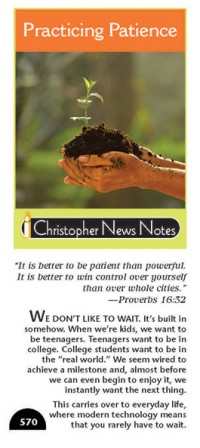 The following is the text of the Christopher News Note “Practicing Patience” (which was written by a freelancer). If you’d like a pdf or hard copy, see the end of this post:
The following is the text of the Christopher News Note “Practicing Patience” (which was written by a freelancer). If you’d like a pdf or hard copy, see the end of this post:
“It is better to be patient than powerful. It is better to win control over yourself than over whole cities.” — Proverbs 16:32
We don’t like to wait. It’s built in somehow. When we’re kids, we want to be teenagers. Teenagers want to be in college. College students want to be in the “real world.” We seem wired to achieve a milestone and, almost before we can even begin to enjoy it, we instantly want the next thing.
This carries over to everyday life, where modern technology means that you rarely have to wait. Want to watch a movie? Stream it immediately. Want to read a book? Download it to your e-reader and begin instantly. Have a quick question for a friend? Text them and they’ll likely interrupt an actual conversation to read your message and answer.
Our natural desire for instant gratification is fostered more and more by retailers such as Walmart offering same-day delivery, Fresh Direct with online grocery shopping and daily delivery, or Disney World selling a pass allowing you to jump to the front of the line.
Narayan Janakiriman, a University of Texas Assistant Professor of Marketing, has done studies on instant gratification’s effect on our society. He concludes, “The need for instant gratification is not new, but our expectation of ‘instant’ has become faster, and as a result, our patience is thinner.”
This is such a widespread phenomena that it has coined a phrase: “culture of impatience.” Interestingly, the classical understanding of the opposite of patience was not called impatience, but “wrath.” This is understandable since we often feel anger, resentment, and indignation when we’re thwarted.
Michael, a graphic designer in his 50s, was downloading a video to his iPad one day. He confessed, “I remember timing how long it took a video to load. I was furious and going to send a complaint because I was sick of having my time wasted. I could’ve sworn it took a minute. I was stunned when I saw it was only 14 seconds.” He pauses and then says, “Then it hit me. I was going to complain about waiting a minute. One minute! I try to remember that every time I’m about to lose it over how slow my iPad seems.”
We are living in this “culture of impatience.” Experts worry about how it affects not just little moments in our day, but long-term decision making and motivation, such as saving money or the growing proliferation of “lifestyle drugs” which modify thoughts and behaviors that used to be accepted as normal human variations.
This raises a big question. We want everything good right away. But is instant gratification good for us? Will we be ready for those good things when we get them?
“For My thoughts are not your thoughts, nor are your ways My ways—says the Lord. For as the heavens are higher than the earth, so are My ways higher than your ways, My thoughts higher than your thoughts.”
— Isaiah 55:8-9
Even the Holy Can Be Impatient
“Perhaps there is only one cardinal sin: impatience. Because of impatience we were driven out of Paradise, because of impatience we cannot return.”
— W. H. Auden
Impatience isn’t found only in our time. It is a uniquely human trait following in the steps of our ancestors, right back to the very beginning. It could be argued that impatience led to the Fall of Adam and Eve. They didn’t even wait for their usual evening walk with God to ask Him about the serpent’s lies. They just grabbed the fruit and ate. Some scholars think that eventually God would have allowed them to eat from the tree, but that they simply weren’t ready yet.
The Bible is full of stories of God moving much more slowly than people would like, often forcing patience when it doesn’t make sense. Abraham and Sarah were far past child bearing age before God promised them a son. Moses was 40 years old when he fled to the desert and spent another 40 years as a shepherd before he saw the burning bush.
Often, these same stories show us forced patience on one hand and human impatience on the other. Abraham’s wife Sarah, for instance, grew impatient because it took her 25 years to conceive the son, Isaac, that God had promised her. During that long wait, she gave her maid to Abraham as a surrogate, which began a cascade of jealousy and hurt. In Moses’s case, the Hebrews wandering in the desert were continually impatient for an easier life, leading Moses to be equally impatient with God. This led to them wandering the desert for 40 years without ever being allowed into the Promised Land.
In God’s Time
“The Lord does not delay His promise, as some regard ‘delay,’ but He is patient with you, not wishing that any should perish but that all should come to repentance.”
— 2 Peter 3:9
As Peter points out, God sees the whole picture while we only see a tiny bit. Patience means we have to accept the fact that we are not in control of arranging certain things in our lives.
Anthony DeStefano, in his book “Ten Prayers God Always Says Yes To,” points out that God often has to “arrange” a lot of details to move your life in the direction that is best for you. He says that sometimes we are like a circling airplane in a holding pattern, with God as the air-traffic controller: “While we’re busy circling, he’s busy clearing obstacles, solving problems and moving people around until things are just right. Then and only then does he permit us to come in for a safe, smooth landing.”
When we act impatiently ahead of schedule, that just leaves more to be arranged before our desired “landing” can happen.
Author Julie Davis learned about patience when praying for her father to accept God. “I prayed and waited 10 years,” she says, “and it was a deathbed conversion. Every time I tried to help things along by giving him a book or talking about faith, it backfired. In fact, one botched attempt left him refusing to even talk to me, throwing the phone across the room if I called. After that, I realized that God had put a desire in my heart for my father’s conversion, but that my part was simply to pray and be faithful.”
“When Dad finally accepted God,” Davis continues, “I was the only one with him, all alone. It took a leap of faith for me and for him. And we took it together. Looking back I realize that God used that 10 years to prepare my father and also to change me. In the end, the only thing I could do to show God to my father was be the best Christian I could around him. That took patience and humility. A lot of patience and humility.”
It takes many small moments, events, and days for God’s plans to come to fruition. We must wait, be patient, allow growth. It is a maturing process which we often cannot predict until enough time has gone by.
For in hope we were saved. Now hope that is seen is not hope. For who hopes for what is seen? But if we hope for what we do not see, we wait for it with patience. Likewise the Spirit helps us in our weakness. — Romans 8:24-26
Five Steps Toward Patience
“Patience is not passive; on the contrary it is active, it is concentrated strength.”
— Edward Bulwer-Lytton
Circling back to where we began thinking about patience, what do little things like video streaming times have to do with big life events?
All the daily, seemingly insignificant trials and misfortunes build endurance. Continual practice over life’s unexpected inconveniences helps prepare us for the big events that try our patience. Through all this, God is always at work in small ways, moving to bring us closer to Him.
Here are a few practical pointers to help us do our part in meeting God halfway on the road to greater patience:
1. Pray. Ask God to help you become more patient. Don’t be surprised if this leads to more situations that make you impatient. A workout might be needed to help strengthen your “patience muscles” and no one knows better than God what will help you grow. But with God’s help you will become better and better at patience.
2. Embrace daily impatience as a chance to practice patience. “I try to remember,” says Janet, a wife, mother and homemaker, “that when I’m forced to wait in a line for 10 minutes, it is a chance to pray, especially for the people who are making me wait. And I was pretty excited when I realized that I’ve gotten better at being ‘automatically’ patient in certain situations.”
3. Identify impatience “triggers.” As you become more aware of the times your patience fails, you will be amazed at how easily you recognize the signals of increasing impatience. Then it is a matter of mindful behavior instead of automatic impatience. If you have trouble identifying triggers, try asking your friends or family. Often what is invisible to us is obvious to others.
4. Live in the present moment. Remember that we can’t control what “should” or “could” be happening a lot of the time. Sometimes all we can control is our expectations and reactions. Instead of thinking about what you “could” be doing, stop and think about what is happening around you at this moment. Something as simple as stepping outside for five minutes can give you a new perspective.
5. Remember to be patient with yourself. We can’t become perfect overnight and a lifetime of impatience might need years of practice to overcome. St. Francis De Sales put it well in his book Introduction to the Devout Life: “Have patience with all things, but first of all with yourself. Do not lose courage in considering your own imperfections, but instantly set about remedying them—every day begin the task anew.”
Dear Lord, forgive my impatience. Help me to be more patient in all circumstances and to know that You are with me in the trials of daily life. Amen.
To receive a pdf or mailed copy of “Practicing Patience,” email your request to [email protected]












